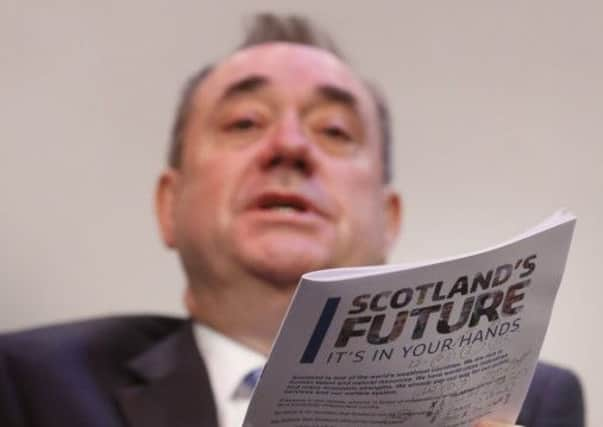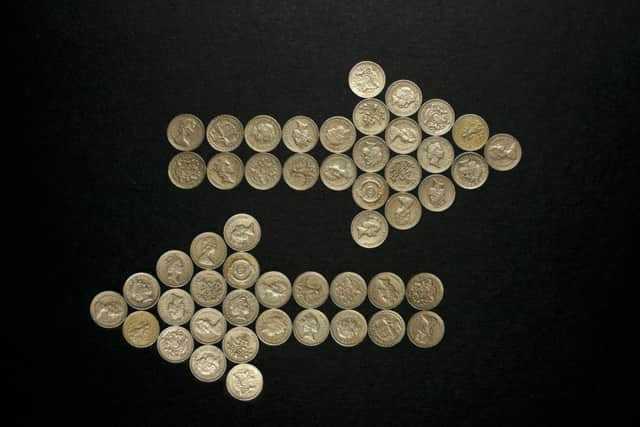Alex Salmond predicts backlash on currency refusal


Last night senior figures in the Scottish National Party said the First Minister had hardened his stance on the issue and would be refusing to publicly consider alternatives to the key policy laid out in the Scottish Government’s White Paper on independence.
Earlier both Salmond and his deputy, Nicola Sturgeon, appeared to suggest there were viable alternatives to a shared currency after the Chancellor George Osborne, backed by the Shadow Chancellor Ed Balls and Treasury Secretary Danny Alexander, rejected the idea.
Advertisement
Hide AdAdvertisement
Hide AdYesterday SNP figures said they believed the move by the pro-UK parties would backfire. They claimed Westminster would be forced into a climbdown after a Yes vote amid concerns over the impact on business and a backlash among Scots.


But with opponents presenting a united front on such a crucial part of the SNP’s independence strategy, there are demands from both sides of the debate for Salmond to come up with a Plan B. Last night an SNP parliamentarian told Scotland on Sunday: “Alex’s line won’t hold. We should have sorted an alternative proposal months ago.”
Yesterday the First Minister sent a letter to Prime Minister David Cameron complaining of “bullying behaviour” by Westminster ministers over the independence plans.
The Scottish Government initially appeared to be caught on the back foot after all three pro-union parties declared they would block a formal currency union. Both Alex Salmond and Nicola Sturgeon initially dropped hints that they were ready to look at alternatives like simply using the pound informally, but their position has hardened up over the weekend.
One of the most dramatic weeks in the referendum campaign so far saw Osborne take the Yes camp by surprise as he made clear in a speech in Edinburgh that the UK would not enter the SNP’s favoured monetary union arrangement - allowing Scotland to keep the pound with the Bank of England remaining as Scotland’s lender of last resort.
The SNP administration has already dismissed Osborne’s speech as “bluff, bluster and bullying”.
Salmond will attack Osborne when he speaks to the pro-independence Business for Scotland organisation in Aberdeen tomorrow.
He said yesterday: “The reality is the pound is as much Scotland’s as the rest of the UK’s. By suggesting otherwise, the Westminster establishment – Tories, Labour and Lib Dems – are reaping a backlash from the ordinary people of Scotland, who feel this is an attempt to bully Scotland ahead of the democratic choice we all look forward to this September.
Advertisement
Hide AdAdvertisement
Hide Ad“A currency union not only favours Scotland but is in the clear economic interests of the UK as well.”
The Scottish Government insists separate currencies would cost English firms £500m in transaction costs during cross-border trade.
Salmond added: “The Chancellor will have to wake up to the fact that he cannot lay claim to assets to which Scotland has a share – such as the Bank of England and the pound – and still expect an independent Scotland to meet a share of UK liabilities.”
London ministers will “smartly change their tune” after a Yes vote, according to Salmond.
The First Minister’s comments regarding debt liabilities have been branded reckless by pro-Union politicians and campaigners, who have also called for him to bring forward his Plan B on currency arrangements.
But one senior SNP figure said: “It shouldn’t exactly have been a surprise that Osborne would make this announcement. It was more a matter of when rather than if.
“We should have made sure that we had a stronger alternative to offer. Just saying ‘they’re bluffing’ isn’t persuasive to the voters we need to win round.
“It’s great for the converted but it’s not going to bring don’t knows on board.
Advertisement
Hide AdAdvertisement
Hide Ad“Alex’s line won’t hold for seven months. We should have sorted an alternative proposal months ago. Even if his line that Westminster is bullying Scotland gets any traction, that’s not going to make people gamble with their mortgage rates or their pensions.”
A measure of the “game-changing” impact of the Chancellor’s speech has been the emergence of senior figures on both sides of the referendum debate calling for alternatives to a currency union to be examined.
Business figures such as Owen Kelly of Scottish Financial Enterprise and Liz Cameron of the Scottish Chambers of Commerce now want other options looked at to determine their impact on business.
Key Nationalist figures like former SNP deputy leader Jim Sillars, Yes Scotland chairman Dennis Canavan and Greens leader Patrick Harvie have stepped up their calls for a separate Scottish currency to be examined.
Even members of Salmond’s own Fiscal Commission which endorsed the currency union have been suggesting alternatives with Sir James Mirlees, suggesting “a Scottish pound” should be looked at as an alternative, while Professor Andrew Hughes Hallett said there is nothing to stop Scotland using the pound informally.
Political opponents including Treasury Secretary Danny Alexander and Better Together leader Alistair Darling, the former Chancellor have also stepped up their calls for Salmond to come up with a Plan B.
Darling claimed yesterday that the Nationalists “have been divided” since it was made clear that Scotland could not leave the UK and at the same time keep the pound.
“Alex Salmond must urgently tell us what his fall-back position now is,” Darling added. “People in Scotland need to know what currency will be in their wallet or purse if we leave the UK.”
Advertisement
Hide AdAdvertisement
Hide AdAlexander, the Chief Secretary to the Treasury, has urged the Scottish Government to set out an alternative currency proposal as a matter of urgency in a letter to the First Minister.
The Liberal Democrat minister insists clarity on currency was of the “utmost importance” and adds “a failure to set out an alternative will deny our fellow citizens the information they need to make a rational decision based on facts and evidence”.
Alexander’s letter continues: “The confidence of many people and of much of the business community will be shaken if it transpires that no such alternative plans have been drawn up with the referendum now only a few months away.”
Meanwhile the Treasury dismissed Salmond’s claim that Osborne’s decision to rule out a currency union was a bluff.
A senior source said: “This was a statement made by one of the most senior figures in Government and supported fully by other senior figures.
“These are people whose political credibility depends on them staying true to their words. The idea that they would turn round to voters in the rest of the UK after a Yes vote and say we’ve changed our position is laughable.”
Timeline: currency affairs
April 1999
The SNP’s manifesto for the inaugural Scottish Parliament election commits the party to joining the Single European Currency when it is adopted.
November 1999
Mr Salmond makes a speech in Brussels where he claims UK economic policy is “made for the south east of England” and damaging Scottish business, before describing the pound as “a millstone round Scotland’s neck”.
November 2005
Advertisement
Hide AdAdvertisement
Hide AdThe SNP paper Raising the Standard says Scotland will continue to use the pound until “such times as Parliament decides to change that position”. Any move to adopt the Euro will require a referendum, it adds.
February 2013
The Scottish Government’s fiscal commission working group, including Nobel laureates Professor Sir James Mirlees and Joseph Stiglitz publish a report which concludes that a “shared currency would be in the interests of the UK given the trade and financial links with Scotland”.
April 2013
Dennis Canavan, chairman of the Yes Scotland campaign, says he would prefer Scotland to adopt its own currency after independence.
January 2014
Bank of England governor Mark Carney warns that an independent Scotland would need to “cede some national sovereignty” to make a currency union with the rest of the UK work.
February 2014
All the main pro-union parties – the Conservatives, Labour and the Liberal Democrats – rule out a formal currency union with the rest of the UK. Chancellor George Osborne warns in a keynote speech in Edinburgh that the “people of the rest of the UK won’t accept it”.